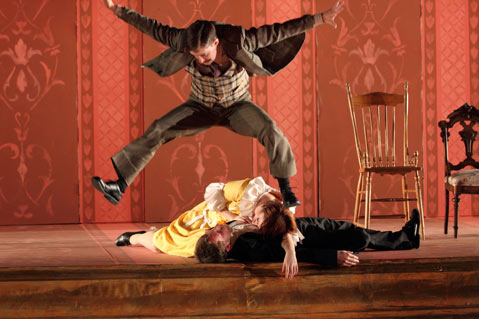33 Swoons at Westmont’s Porter Theatre
John Blondell Directs Three Farces from Chekov

These three early farces of Anton Chekhov bristle with invention, wit, and cataclysmic reversals. In John Blondell’s current production (Porter Theater on the Westmont campus March 3-5), inspired by and named after an innovative version of Chekhov’s work created in 1935 by Russian director Vsevolod Meyerhold, a variety of devices associated with modern theater serve to de-familiarize and reinvigorate the texts.
For example, the first play of the evening, “The Bear” from 1888, began with a special curtain configured to resemble the frame of a picture lowered to within three feet of the floor. Behind it, actors walked back and forth while manipulating the three pieces of a puppet made from a dismembered teddy bear. Visible only from their waists down, the performers in “The Bear” each chose a slightly different way to navigate this unexpected truncation of the playing space. Ben Offringa, who played Luka, the servant, adopted a bent-over posture, the better to be seen through the narrow horizontal opening, and in keeping with his lower status, while Jacqueline Dressler, as Yelena Ivanova Popova, and Sam Martin, as Grigory Stepanovich Smirnoff, confident in their self-importance, chose to ignore the constraint and allowed their faces to be obscured for significant portions of the scene. This unorthodox staging decision led to a range of reflections on the myriad ways that social status affects point of view, and the actors managed to negotiate the obstacle without losing their focus.
In “The Proposal,” the curtain was raised higher, allowing the audience to see the full figures of the actors, but, due to the existence of another constraint—this time a two-foot step in the downstage area—there were more obstacle-based antics, including any number of two-footed leaps. “The Proposal” hinges on the inability of Natalia Stepanovna (a particularly good Jessica Drake) and her father, Stepan Stepanich Chubukov (Sara Reynolds), to remain on good terms with their neighbor Ivan Vassilievich Lomov (Chris Wagstaffe), despite the fact that he wishes to propose to Natalia, and she and her father would like her to accept. The writing shows Chekhov’s impressive assimilation of 18th-century English theater conventions to the more volatile and land-obsessed mores of the Russian gentry, and was ultimately the night’s highlight.



